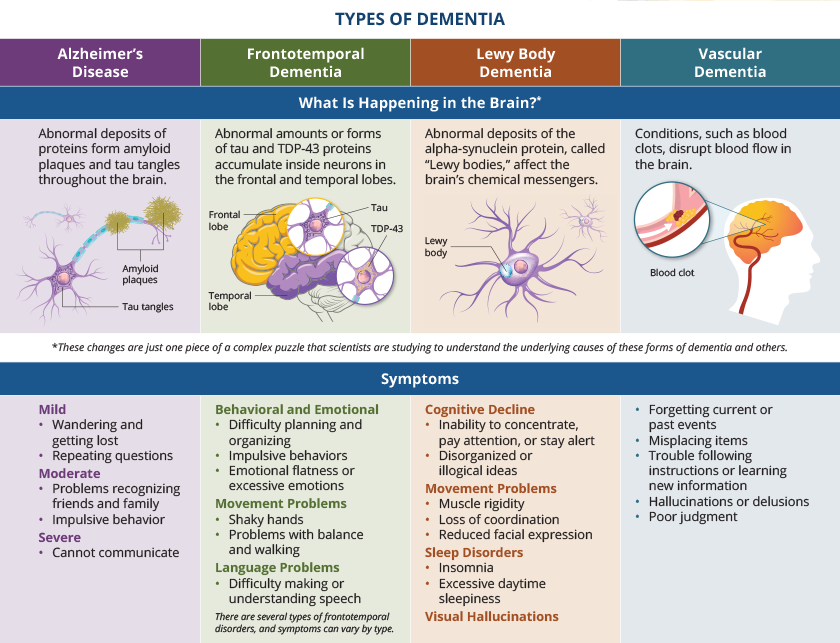
Early Detection: Know sooner, Live Better
We’re glad you’re here! It’s natural to feel nervous or unsure when talking about memory loss. We’re here to help.
The sooner you know and the earlier you act, the more we can do to slow cognitive decline, improve quality of life, and prepare yourself and your loved ones.
If you need help now:
Call the Alzheimer’s Association 24/7 Helpline at 1-800-272-3900 for free support and connect with a live person who can provide information, local resources, crisis assistance and emotional support.
Signs & Symptoms
Dementia is not a normal part of aging. Here’s signs or symptoms to look out for vs. normal age-related memory changes.
Download PDF: English, Traditional Chinese, Simplified Chinese, Japanese, Korean, Tagalog, Marshallese, Pohnpeian, Samoan
Healthy Aging Brain
- Sometimes forgets names or appointments, but remembers later.
- Occasional errors with numbers, like with finances or household bills.
- Sometimes needs help using new devices
- Forgetting which day it is but remembering it later.
- Vision changes related to cataracts.
- Sometimes forgetting which word to use.
- Misplacing things from time to time and retracing steps to find them.
- Occasionally makes a poor decision or mistake.
- Sometimes feeling uninterested in family or social obligations.
- Having specific ways of doing things and annoyance at disruption in routine
Dementia Warning Sign
- Memory loss that disrupts daily life
- Challenges in planning or solving problems
- Difficulty completing familiar tasks
- Confusion with time or place
- Difficulty understanding vision or space
- New problems with words in speaking or writing
- Misplacing things and being unable to retrace steps to find them
- Poor judgment and decision-making
- Withdrawal from work or social activities
- Changes in mood and personality
Get checked. Early detection matters.
Talk to your health care provider to see if your symptoms are related to dementia or a more treatable condition. Finding out early and getting the right diagnosis gives you more treatment options, opportunity to slow disease progression and manage symptoms.
There are many types of dementia that cause problems with remembering, thinking, or making daily decisions. Dementia symptoms can vary widely from person to person.
There is hope, care and support for you on this journey.
Find a Healthcare Provider
Start by visiting your primary care physician, internal medicine or family medicine doctor.
Ask how familiar they are with diagnosing dementia and whether they would refer to a specialist.
Choosing a DoctorIf you don’t have a health care provider, here’s a few agencies that can help you find one:
-
Statewide
Statewide Health Care Providers:
-
Hawaii Pacific Health
-
The Queens Health System
-
Kaiser Permanente
-
Med-Quest
-
-
Hawaiʻi Island
Hawaiʻi Island Health Care Providers:
-
Hilo
-
Kona
-
Hawai’i Island
-
-
Kauaʻi
Kauaʻi Health Care Providers:
-
HHSC Kauaʻi Region
-
Wilcox Health
-
Kauaʻi Medical Associates
-
-
Lānaʻi
Lānaʻi Health Care Providers:
-
Lānaʻi Community Health Center
-
-
Maui
Maui Health Care Providers:
-
Maui Health
-
Maui Medical Group
-
-
Molokaʻi
Molokaʻi Health Care Providers:
-
Molokaʻi Community Health Center
-
Molokaʻi General Hospital
-
What to expect at your appointment
Health care providers should do cognitive screenings during regular annual physical exams. Our brain health is part of our overall physical health. This is included in the Medicare Annual Wellness Visit.
Since there could be many different causes for cognitive impairment, the health care provider will assess overall health, review medical history, perform a physical exam and laboratory tests to help identify other health issues that may be affecting cognition. The health care provider should address those health concerns first.
Some common causes of memory and thinking problems can be treated or even reversed. The health care provider will look for things like depression, hearing issues, delirium or sudden confusion, alcohol use or overdose, side effects from medications, uncontrolled illnesses or infections (e.g., urinary tract infections, which are common), vitamin B12 deficiencies, transient ischemic attacks, strokes, and other cardiovascular diseases.
If other causes are ruled out, the health care provider may pursue a full evaluation with additional tests and exams. They make a referral to a specialist like a Neurologist, Geriatrician, Psychiatrist or Psychologist.
They may perform cognitive assessments like the Mini-Cog, Saint Louis University Mental Status (SLUMS), Mini-Mental State Exam (MMSE), Ascertain Dementia 8 (AD8) for Informant/Family Questionnaire, etc. In these assessments, the health care provider will ask you questions.
Next, they may proceed with brain imaging. This can include a Magnetic Resonance Imaging (MRI), Computed Tomography (CT) scan, or Amyloid Positron Emission Tomography (PET) scan. This Amyloid PET scan is the gold standard for Alzheimer’s disease diagnosis. It is not yet available in Hawai’i, but it is coming soon!
There are also biomarker tests available for Alzheimer’s disease, such as Cerebrospinal Fluid (CSF) Analysis, and Blood-Based Biomarkers (BBM).
Talk to your health care provider about what is right for you.
What's Next After Diagnosis
Whether you’re waiting for a diagnosis or have just received one, it can feel overwhelming. The process is often hard and can take time — but it also opens the door to options. Sometimes, it’s a relief to finally have answers.
While no one is ever truly prepared, you’re not alone. This is the beginning of a new chapter. There are steps you can take to live well with dementia. With the right information, support, and community, you can move forward with aloha, hope, and dignity.
Explore Next StepsTypes of Dementia
Dementia is a general term for a group of symptoms such as memory loss, difficulties with language, problem-solving, and other cognitive functions caused by abnormal changes in the brain, damage to brain cells, and various brain diseases. There are over a 100 types of dementia. Alzheimer’s disease is the most common type of dementia, but there is also Frontotemporal dementia, Lewy Body dementia, Parkinson’s disease dementia, Vascular dementia, and mixed dementia. Check out this infographic from the National Institute on Aging.
Brain Health
Nearly half of dementia cases could be reduced by addressing potentially modifiable lifestyle risk factors.
It is normal for our brains to change as you age, but not everyone gets dementia when they grow old. Research shows that lifestyle choices can impact our brain health. It is possible to reduce your risk for cognitive decline and dementia.
Join us on this journey to wellness and brain health, one day at a time, one step at a time.
Learn MoreSign Up for Our Email Newsletter
Receive News, Alerts & Updates via Email





Forgetting Familiar Directions?
New Difficulties with Numbers?
Forgetfulness or Dementia?
Frequently Forgetting Dates?